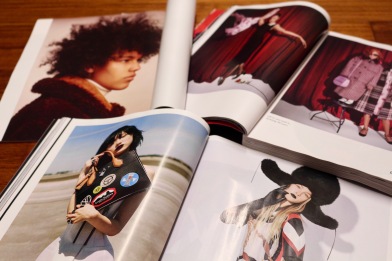By Cole Coyer

The models and designers at New York Fashion Week demonstrated an increase of diversity within the industry. (Courtesy of
New York Fashion Week (NYFW) was full of surprises. Kanye West failed, Anniesa Hasibuan made history and Christian Sirano featured plus-sized models without declaring a complementary hashtag. These shows, among many others, displayed elevated diversity, a trend that is certainly in style at Fashion Week.
Even though diversity is increasing, it is an uphill battle for modeling agencies and designers alike. The Fashion Spot’s diversity report on Fashion Weeks around the world revealed that the diversity gap is still noticeably wide. Of all models represented, 77.6 percent were white while only 8.5 were black. A mere 0.1 percent of models were plus-sized, which still surpassed the 0.06 percent of transgender models. Only five models worldwide were over 50, four of whom walked in New York. With disheartening numbers, leaders of the industry worked to tackle the issue head on.
The call for increased diversity in the fashion industry has been outright and clear. In this year’s health initiative letter, Diane von Furstenberg and Steven Kolb of the Council of Fashion Designers of America (CFDA) relayed information from the Diversity Council about increasing variety in models. Their main goal was to encourage modeling agencies to hire a wide variety of clients in order to represent a rich variety of skin colors, sexual identities and body sizes on the runway. While industry leaders are working to heighten the level of diversity, designers have taken it a step further.
Hasibuan’s show at NYFW highlighted models wearing hijabs, an Islamic headpiece typically covering the head and chest. Hijabs are not a new phenomenon to Fashion Week, but Hasibuan’s show featured 100 percent of the models wearing the traditional Muslim head garb. The show, which was the first of its kind,has been viewed as a huge leap forward for bringing the hijab into the mainstream.
Retailers such as H&M and Dolce and Gabbana are trying to capitalize on the moment. Muslim fashion currently features hijab-wearing models and fashion retailers release lines of hijabs and abayas, another traditional Muslim article of clothing. Hasibuan’s show, combined with major retailers marketing Muslim articles of clothing, demonstrated the desire for their integration in the American clothing market.
Following the pattern of inclusivity, body image had its own champion: Christian Sirano. Sirano featured multiple plus-sized models and did so without making it a spectacle. When questioned in interviews about his models, he spoke simply of his love for dressing women of all shapes and sizes in order to promote diversity. He did not issue a press release or coin a hashtag in reference to his decision, but had his models do the talking. His nonchalant nature was among the biggest statements about body diversity at NYFW, showing his true talent and class.
Religious garments and body image were not the only topics of diversity underlined at NYFW. DapperQ’s third annual iD show took place at the Brooklyn Museum with its largest showcase to date. The runway event featured gender queer and androgynous styles crafted by seven different designers from New York, Los Angeles and London.
Each designer’s work centered around gender nonconformity and how it correlates with different aspects of present-day society and culture. Jaden Smith, the latest face of Louis Vuitton women’s wear, is among the many celebrity clientele of designers featured in DapperQ’s latest event. The size of the show, along with the open support from people in the public eye, demonstrated that the industry is confronting the issue of negative perceptions of certain sexual orientations and LGBTQ identities.
Now that this season’s NYFW has concluded, the fashion world at large looks onward to the spring. Only time will tell if diversity will continue onto the runways in 2017, but with designers like Hasibuan and Sirano and DapperQ’s iD show, it is evident that inclusion has infiltrated Fashion Week.
